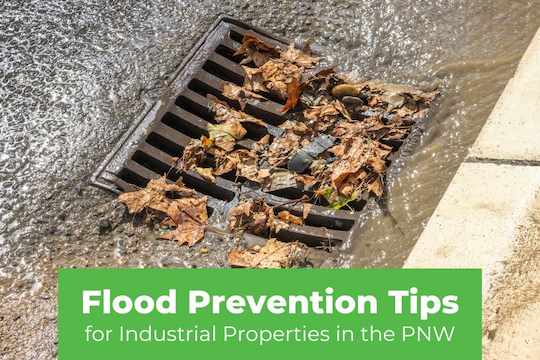Like other businesses, stormwater management is a critical issue that hospitals need to address. Proper management helps protect local water sources and the environment while preventing costly damage to hospital facilities and equipment. Stormwater management for hospitals also keeps patients and employees safe.
Many hospitals face challenges regarding stormwater management, although strategies and best practices exist to remedy the more common issues. The following overview details some challenges and potential solutions to hospital stormwater management issues.
Why Do Hospitals Need Stormwater Management?

Stormwater management is essential for hospitals; many have acres of impervious surfaces, including parking lots, sidewalks, and roofs. These surfaces can generate millions of gallons of stormwater runoff that makes its way directly into the local waterways after each rain.
Not all systems receive the maintenance they require, which can set hospitals up for problems when the rainy season hits. The costs to maintain and repair the stormwater system will be higher if the hospital needs to catch up on past-due maintenance or schedule an emergency service call to fix urgent problems.
Due to space restrictions, hospitals in densely populated or urban areas often need help managing and treating stormwater on hospital grounds. Healthcare facilities may need more space for necessary infrastructure, such as adequate drainage systems or retention ponds.
Properly managing a stormwater system requires training and education regarding best practices, which hospital staff may still need to receive. The hospital also may need funds in its budget or from outside sources to properly manage and maintain its stormwater management system.
Risks of a Poorly Maintained Hospital Stormwater System

If stormwater management for hospitals does not receive the attention it needs, several problems can happen during and after rainstorms. Heavy rains and stormwater runoff can cause flooding and damage the property. Nearby bodies of water that receive the runoff can become polluted if the hospital’s overall system does not properly or adequately clean and filter the runoff.
Hospitals can also suffer fines and other issues due to noncompliance with state, local, or federal regulations regarding proper stormwater management. The hospital risks injuring patients, visitors, and staff due to flooded areas and related hazards on the property. Hospitals risk damaging expensive equipment or facilities due to water infiltration or flooding.
Important Stormwater System Maintenance Routines
Hospitals must proactively manage their stormwater system, which requires a regular maintenance schedule. As part of stormwater management, regular storm sewer catch basin cleaning can serve as part of a more comprehensive stormwater maintenance plan.
The stormwater system captures and conveys stormwater from surrounding surfaces and channels it safely away from the property. The system relies on catch basins, placed at the entry points of the sewer system, to filter debris, garbage, and other items from the water flow to keep the stormwater clean and the system flowing freely.
However, If the catch basins do not receive regular cleaning and maintenance, they become clogged with pollutants, debris, and sediment. The clogged drains can lead to flooding, environmental degradation in the surrounding areas, and other issues.
Hospital Best Practices for Stormwater Management
Staff education and community outreach on protecting the environment can lay a solid foundation for a stormwater management plan. A well-developed stormwater management plan can outline best practices and strategies for hospitals to manage stormwater runoff.
The basics of a well-designed system can include stormwater ponds and wetlands to act as natural filters, erosion control measures to reduce the amount of sediment carried away by runoff, and monitoring and evaluation by the hospital or a qualified outside vendor to keep the system in good repair throughout the year.

Stormwater management for hospitals takes many forms. More recent initiatives for greener solutions, for example, have led to landscaping solutions, such as rain gardens, that beautify the property while managing runoff in a more environmentally friendly manner.
Rain gardens are large, landscaped areas with permeable surfaces that allow rainwater to soak in where it lands, avoiding a runoff.
Stormwater is a valuable resource that has yet to get the appreciation it deserves. Hospitals can take advantage of this resource by collecting and harvesting their runoff to irrigate the property and for other uses that don’t require potable water.
Call the Experts for Help
Stormwater management is a critical issue for hospitals, and a well-managed system prevents negative impacts on the hospital and the surrounding community.
A proactive approach to stormwater management begins with regular catch basin cleaning and other maintenance tasks. Hospitals with minimal staff or proper training to maintain their system can outsource the work to a professional, qualified team.
The stormwater professionals at CatchAll Environmental perform affordable drain cleaning, among many other tasks, for various business customers. Our team is also well-versed in regulatory requirements and the related paperwork and can offer guidance and complete it for you.
Let us take the maintenance off your hands. We will provide the staffing and the expertise to manage your stormwater system as if it were on autopilot. Contact us for more information today.













